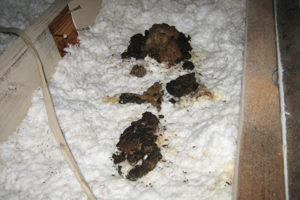Raccoon Feces Hazards
 Aside from the yuk factor associated with this picture, there are several other problems that consumers should be aware of when faced with the problem of raccoons living in their attic. In the writer’s opinion, raccoon feces hazards are at the top of the list, but there are others as well.
Aside from the yuk factor associated with this picture, there are several other problems that consumers should be aware of when faced with the problem of raccoons living in their attic. In the writer’s opinion, raccoon feces hazards are at the top of the list, but there are others as well.
These include damage to the home at the entrance area to the attic; damage to the insulation; if it goes long enough, the urine-soaked urine can seep through to the ceiling underneath; and raccoons living in your home will begin to damage other items around your home and yard. If you do not do anything, it is likely your neighbors will be upset as well. Then there is the smell. You may get used to it, but anyone visiting your home will notice. But let’s get back to the main topic and what to do about the problem.
Raccoon Feces Hazards
Raccoons are typically infected with roundworms. These tiny worms live in the raccoon’s intestines and are expelled in their feces. The exciting thing about these worms is that their eggs can live in severely dry conditions, like an attic, for many months or longer. They are tiny microscopic eggs that can float in the air if disturbed.
Someone in the attic and not aware of raccoon feces hazards like this can disturb the feces causing the dried feces dust, including the eggs, to float in the air, which is then breathed into the lungs of the person in the attic unless they are wearing protective breathing apparatus.
The eggs hatch inside you and make their way to their host’s eyes and brain. This sounds gruesome, but it can lead to blindness or death if not treated.
If you suspect raccoons live in your attic, hire professionals to solve the problem. Install a one-way trap door so they can get out of the attic but not back inside. Have the insulation replaced by professionals who are wearing the appropriate safety equipment and will dispose of the old insulation appropriately.
While you are at it, seal all potential entry points with heavy gauge wire so no more animals can enter. Also, increase the insulation in your attic to levels that meet today’s standards for new home construction to save energy heating your home.
For more posts about health risks associated with raccoons, click here.
You can follow any responses to this entry through the RSS 2.0 feed. You can leave a response, or trackback from your own site.

Leave a Reply